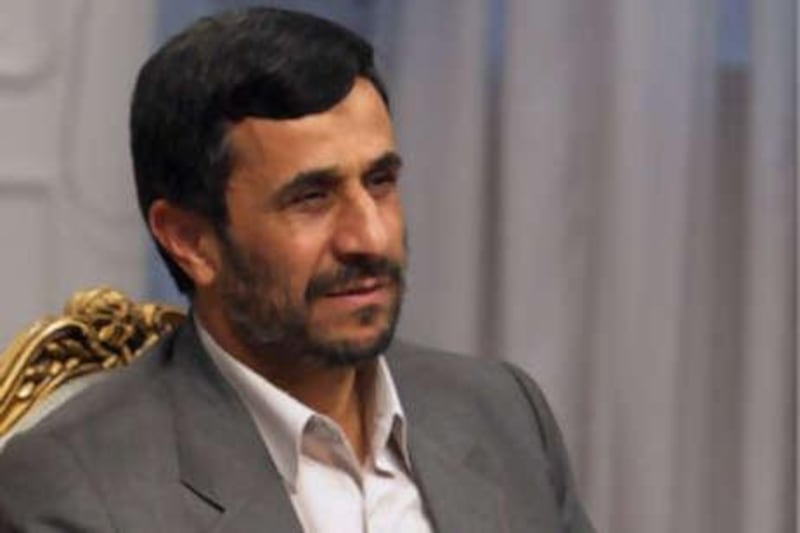TEHRAN // Hardliners and conservatives in Iran have criticised a letter written by Mahmoud Ahmadinejad, the president, congratulating Barack Obama, the US president-elect, while some reformists and analysts see it as a possible breakthrough in relations between the two countries. The letter is the second official message Mr Ahmadinejad has written to a US president, after an 18-page letter he sent to George W Bush in 2006.
The Iranian president's hardline and conservative critics claim his initiative was an act against Iran's national dignity and principles. The conservative Jomhuri Eslami newspaper yesterday carried a harsh editorial with the headline "Falling in Love with a Mirage". The editorial said making a decision to resume relations with the US was a major policy-making issue and, according to the Iranian constitution, such matters fall within the jurisdiction of the supreme leader, not the president.
Congratulating a US president just elected whose policies and future course of action were still unclear was not a well-studied act, it said. Jomhuri Eslami also said that in view of Ayatollah Ali Khamenei's recent remarks about US hostility towards Iran, it was clear the he had not yet decided to open talks. However, Mr Ahmadinejad's letter was intended to show interest in direct negotiations, said Mohammed Marandi, the head of the Institute for North American and European Studies in Tehran. "He should work to develop a favourable atmosphere and recognise Iran's sovereignty and grievances," he was reported as saying in the Washington Post, adding that Iran expected Mr Obama to take clear steps to reduce tensions.
During his election campaign, Mr Obama said he would be willing to talk with Mr Ahmadinejad. However, Tzipi Livni, Israel's foreign minister, warned Mr Obama against talks, saying it would be a sign of weakness. Mr Ahmadinejad's letter called for the new US president to implement a foreign policy of "non-interference". He continued: "Other nations also expect war-oriented policies, occupation, bullying, contempt of nations and imposing discriminatory policies on them to be replaced by the ones advocating justice, respect for human rights, friendship and non-interference in other countries' internal affairs.
"They also want US intervention to be limited to its [own] borders, especially in the Middle East. It is highly expected to reverse the unfair attitude towards restoring the rights of the Palestinians, Iraqis and Afghans," Mr Ahmadinejad said. Mojtaba Samareh Hashemi, Mr Ahmadinejad's top adviser, said the letter was "a historical mission" carried out by the president. But some conservative legislators said it was an unnecessary and costly act that would force Iran into a defensive position against Washington.
In an open letter to Mr Ahmadinejad on Saturday, Ahmad Tavvakoli, a hardline legislator, said US leaders had several times ignored the Iranian president's "unilateral" initiatives, such as the unanswered letter Mr Ahmadinejad had sent to Mr Bush. "The reason your predecessors did not do the same was not that they were ignorant of the appropriate diplomatic protocol in such cases," Mr Tavvakoli said in his letter.
"[They did not congratulate newly elected US presidents] because of the emphasis that Ayatollah Khomeini and Supreme Leader Ayatollah Khamenei lay on wise and dignified expediency as well as the fact that continued US hostility and political non-differentiation between the policies of Republicans and Democrats [towards Iran] had left no room for unilateral ethical protocol." Some hardliners and conservatives see Mr Obama's choice of Rahm Emanuel as chief of staff, his promises of support for Israel and his opposition to Iran's nuclear programme as reasons no real change in US policy towards Iran could be expected.
The conservative Hamshahri newspaper, which is aligned to the mayor of Tehran, Mohammed Bagher Qalibaf, a possible contender in June's presidential elections, also criticised Mr Ahmadinejad. An editorial in the paper said the letter calls into question the Islamic Republic's stances against international powers. Some other hardliners and conservatives, however, have supported or defended Mr Ahmadinejad's initiative or called Mr Obama's election an opportunity to resolve the long-standing differences.
The Resalat newspaper, the mouthpiece of the conservative Islamic Coalition Party (Motalefeh), said the letter was a defendable deed, the election of Mr Obama was an opportunity and Iran's policies towards the United States should be realistic. Some reformist newspapers, such as Etemad and Aftab Yazd called Mr Ahmadinejad's initiative "breaking taboos" but most reformists urged caution in taking future steps.
"If [the writing of the letter] is part of a meditated process it can be considered as a taboo-breaking act that will benefit the country," Aftab Yazd wrote in an editorial. Ordinary Iranians who are more used to anti-American rhetoric from Mr Ahmadinejad were shocked by his act but praised the president. "I want to thank Mr Ahmadinejad for taking such a brave step. This opportunity can be used to put an end to all the baseless hostility that has preoccupied everyone for so many years," said Ali Torabi, 45, a shopkeeper from Tehran.
Goli Esmaili, 38, a teacher, said: "Mr Ahmadinejad took this rare chance to show goodwill. I hope Mr Obama will also seize the opportunity to improve relations with Iran. "I only wish he would stop taking the course of his predecessors and does not see us as a nation seeking nuclear bombs to destroy others." msinaiee@thenational.ae





